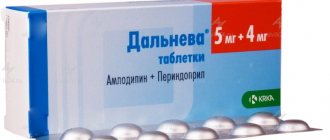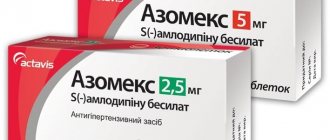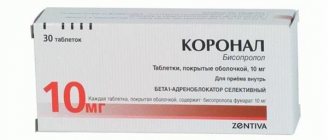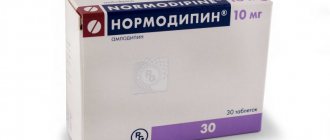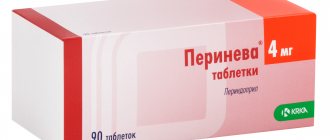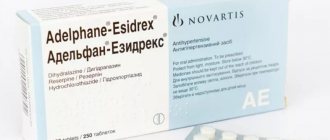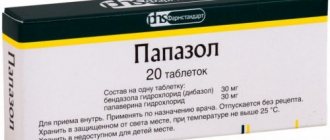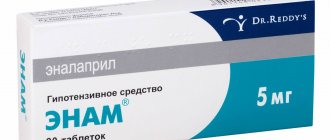Pharmacological action of Prestans
Prestance consists of two active components of different directions - antianginal and antihypertensive. The effect of each component separately and the drug as a whole is considered.
Perindopril in Prestance inhibits kininase II, an enzyme that converts angiotensin I into the vasoconstrictor angiotensin II and destroys the vasodilator bradykinin to an inactive heptapeptide.
By inactivating bradykinin, ACE increases the activity of not only the circulating, but also the tissue kinin-kallikrein system, simultaneously with the activation of the prostaglandin system.
The therapeutic effect of perindopril is due to the inhibition of ACE by the active metabolite perindoprilate. Prestance is used to treat any degree of complexity of arterial hypertension. Its use helps reduce diastolic and systolic blood pressure, both in the supine and standing positions. By reducing peripheral vascular resistance, perindopril improves peripheral blood flow and reduces blood pressure without affecting heart rate. By increasing renal blood flow, the drug does not change the glomerular filtration rate.
Perindopril in Prestance dilates blood vessels, restores the elasticity of large arteries and the structure of the vascular walls of small arteries, and reduces left ventricular hypertrophy.
After a single dose, the maximum antihypertensive effect is achieved after 4-6 hours and lasts 24 hours. Very quickly reducing blood pressure, the drug continues to act with fairly high efficiency 24 hours after administration.
Less than a month from the start of taking Prestance, the therapeutic effect occurs. The drug does not cause addiction, cessation of use is not accompanied by withdrawal syndrome.
A reduction in mortality as a result of diseases of the cardiovascular system and a significant reduction in the incidence of complications when taking perindopril have been confirmed.
Amlodipine in Prestance blocks slow calcium channels of dihydropyridine derivative groups. At the level of dihydropyridine receptors, it prevents the flow of calcium ions to the smooth muscle cells of blood vessels and myocardium. The antihypertensive effect of amlodipine is prolonged and dose-dependent. By relaxing the smooth muscles of blood vessels, it promotes the expansion of:
- The main coronary arteries and arterioles (including in areas of the myocardium affected by ischemia);
- Peripheral arterioles.
The effect of amlodipine in Prestance on the atrioventricular and sinus nodes is weakly expressed, the slowdown of AV conduction is insignificant. A decrease in platelet aggregation helps to increase the glomerular filtration rate and accelerates sodium excretion and diuresis. As a result of the prolonged effect, blood pressure decreases smoothly, reflex stimulation of the sympathetic nervous system is minimal. With hypertension, the degree of hypertrophic changes in the left ventricular myocardium is significantly reduced.
For angina pectoris, a single daily dose of amlodipine in Prestance allows you to increase the total time of physical activity, delay the onset of angina attacks, reducing their frequency, resulting in a reduction in the dose of nitroglycerin consumed.
For arterial hypertension, a single daily dose of the drug will provide a significant reduction in blood pressure for 24 hours in a standing and lying position, without causing acute hypotension due to the slow onset of action.
The absence of a negative effect on the level of lipids in the blood plasma and metabolism has been proven, which allows the drug to be prescribed to patients in the case of bronchial asthma, diabetes mellitus and gout.
Prestance - a combination of perindopril and amlodipine, helps reduce:
- Frequency of angina attacks;
- Risk of heart attack;
- Cardiovascular mortality.
Overdose
There is no data on overdose with Prestan.
An overdose of amlodipine causes: a strong decrease in blood pressure with the possible development of tachycardia and peripheral vasodilation .
Treatment: it is necessary to perform gastric lavage, take activated charcoal , maintain cardiac and respiratory system parameters, control circulating blood volume and diuresis, symptomatic therapy , intravenous administration of calcium gluconate and dopamine .
Symptoms of perindopril : marked decrease in blood pressure, electrolyte disturbances, shock, renal failure, tachycardia , dizziness , anxiety .
Treatment: gastric lavage and activated charcoal , correction of hypovolemia , intravenous administration of catecholamines , hemodialysis .
Prestance release form
Prestance tablets are white, biconvex, engraved on one side with the manufacturer’s logo, on the other with the quantitative ratio of perindopril/amlodipine content. The shape of the tablets depends on this ratio:
- Oblong – 5/5;
- Square – 5/10;
- Triangular – 10/5;
- Round – 10/10.
Excipients: microcrystalline cellulose, lactose monohydrate, magnesium stearate, colloidal anhydrous silicon dioxide.
Prestance tablets are packaged in polypropylene bottles with a dispenser of 30 pieces, the bottle is in a cardboard box with first opening control.
Directions for use and dosage
Prestan is taken orally, preferably in the morning before meals.
Daily dose – 1 tablet in 1 dose.
The dose of the drug is selected after previously titrated doses of its constituent components:
- 5 mg perindopril + 5 mg amlodipine, or
- 5 mg perindopril + 10 mg amlodipine, or
- 10 mg perindopril + 5 mg amlodipine, or
- 10 mg perindopril + 10 mg amlodipine.
In case of therapeutic need, the dose can be changed.
The elimination of perindopril in renal failure and in elderly patients may be slowed down (such patients need to regularly monitor the concentration of creatinine and potassium in the blood plasma). The drug can be prescribed if creatinine clearance is ≥60 ml/min (with creatinine clearance <60 ml/min, Prestansa is contraindicated). It is recommended for such patients to individually select the dose of amlodipine and perindopril.
Equivalent doses of amlodipine are equally well tolerated by all age groups of patients. However, increasing its dose in elderly patients should be done with caution due to age-related changes and an increase in half-life.
For patients with mild or moderate hepatic impairment, therapy is started with low doses, and dose selection is carried out with caution. Optimal doses (initial and maintenance) are selected individually (perindopril and amlodipine are used as monotherapy).
Contraindications
According to the instructions, Prestance is not prescribed in the following cases:
- Angioedema (Quincke's edema), provoked by a previous history of taking ACE inhibitors;
- Hereditary or idiopathic angioedema;
- Severe hypotension (DM less than 90 mm Hg);
- Shock, including cardiogenic;
- Obstruction of the left ventricular outflow tract (aortic stenosis or others);
- Unstable angina (except for Prinzmetal's angina);
- Heart failure after acute myocardial infarction (first 28 days);
- Pregnancy and the entire period of lactation;
- Hereditary lactose intolerance, lactase deficiency, glucose-galactose malabsorption;
- Renal failure (creatinine clearance less than 60 ml/min);
- Under 18 years of age (safety and effectiveness have not been studied);
According to the instructions, Prestance is not prescribed for hypersensitivity to amlodipine (other dihydroperidine derivatives), to perindopril (other ACE inhibitors), or to the excipients included in the drug.
Interaction
Interaction with Perindopril
When taken together with potassium and lithium preparations , potassium-sparing diuretics , some individuals may develop hyperkalemia lithium levels in the blood.
The simultaneous use of ACE inhibitors with non-steroidal anti-inflammatory drugs leads to a weakening of the antihypertensive effect , and can also lead to impaired renal function and an increase in potassium in the blood.
Hypoglycemic agents interact with ACE inhibitors to increase the hypoglycemic effect of insulin and sulfonylurea in individuals with diabetes mellitus .
In patients using diuretics at the beginning of therapy with ACE inhibitors, a significant decrease in blood pressure is likely.
Sympathomimetics weaken the hypotensive effect of ACE inhibitors .
The combined use of ACE inhibitors and drugs for general anesthesia leads to activation of the antihypertensive effect.
Interaction with amlodipine .
The simultaneous use of inducers of the CYP3A4 isoenzyme ( rifampicin , St. John's wort preparations ) leads to a decrease in the concentration of amlodipine in the blood.
Amlodipine activates the hypotensive effect of other blood pressure pills.
In studies, Prestance tablets did not affect the pharmacokinetics of digoxin, atorvastatin, warfarin and cyclosporine .
Drinking grapefruit juice or grapefruits increases the bioavailability of amlodipine in some patients, which can lead to a significant decrease in blood pressure.
Tricyclic antidepressants, neuroleptics , Amifostine, Baclofen, antihypertensives, vasodilators enhance the antihypertensive effect of perindopril and amlodipine .
Side effects
According to reviews, Prestance often causes:
- Drowsiness, headache, dizziness;
- Visual impairment;
- Noise in ears;
- Palpitations, flushing, decreased blood pressure;
- Shortness of breath, cough;
- Abdominal pain, nausea, vomiting, diarrhea, constipation;
- Skin itching, rash;
- Muscle spasms.
Also, Prestance, according to reviews, sometimes causes other disorders. If any side effects occur, urgent consultation with a doctor is necessary.
For arterial hypertension or coronary artery disease, Prestance, according to reviews, helps improve well-being and stabilize the condition for a long time.
special instructions
The elimination of perindopril is slowed down in the elderly and in patients with renal and heart failure , so they should regularly check the concentration of potassium and creatinine in the blood plasma.
Due to a possible strong decrease in blood pressure, the development of drowsiness, dizziness and other side effects, you should be careful when driving, especially at the beginning of therapy and when increasing the dose used.
Who is the drug contraindicated for?
Although these blood pressure pills provide excellent results, they should not be taken if a person has:
- Reduced blood pressure.
- Shock.
- There is a risk of angioedema from using the drug.
- Kidney failure.
- Lactose deficiency, since lactose is found in excipients.
- Myocardial infarction.
- Pregnancy.
Persons under 18 years of age are not allowed to take this drug, since there is no data on the effect of the drug on the child’s body.
Reviews about the medication
Most positive reviews from patients are due not only to the effectiveness of the drug, but also to its other positive characteristics. So many note that the drug very gently stabilizes blood pressure and maintains the condition normal for a long time. And even though the medication has a large list of side effects, they occur very rarely.
Basically, only those patients whose body reacted negatively to taking the medicine respond negatively. In addition, like the Prestance medication, the instructions for use of analogues recommend taking them in accordance with a clear dosing system. Independently increasing or decreasing the dose of medication can worsen the patient’s condition and lead to many negative consequences.
Reviews about the medicine
The negative attitude of patients towards the medicine is explained by the presence of a large number of contraindications and side effects, just like the Prestance remedy. Instructions for use, reviews, analogues recommend using only as prescribed by the attending physician, who will select the safest and most effective dosing system. This is the only way to avoid the negative effects of the medication on the body and normalize your health. And almost everyone who heeded these recommendations is very pleased with the result of the treatment and speaks positively about the medicine “Coriprene”.
Similar medicines
Prestance tablets, Russian analogues of which can be purchased at pharmacies, help with heart diseases. If for some reason this drug is not suitable, it should be replaced with a medication with the same active ingredients.
The best analogue of such a drug is Dalneva tablets. Such medications differ only in the ratio of active ingredients in the composition. The drug "Dalneva" is available in dosages of 5:4, 10:4, 5:8, 10:8. The last number is the amount of perindopril, and the first is amlodipine.
An analogue of Prestance in terms of pharmacological action is Triapin. Of course, there are other similar drugs, such as Enanorm, Equacard, Coripren and others. All of the medications listed can only be purchased with a prescription.
Pharmacokinetics of tablets
The drug is intended for oral administration. After use, the tablet enters the gastrointestinal tract, where it breaks down into metabolites under the influence of gastric juice. The maximum content of components in the blood is achieved 60 minutes after taking the tablet. The half-life is 1 hour.
Perindopril does not exhibit pharmacological activity: 27% penetrates into the blood vessels in the form of an active metabolite, the remaining components do not play a clinical role. The maximum concentration of the perindoprilate metabolite is reached 3 hours after taking the tablet. The bioavailability of the drug decreases when taken simultaneously with food, so it is recommended to take the tablets once a day in the morning before breakfast.
Blood protein binding is 20%. Metabolites are excreted through the kidneys. The half-life is 17 hours.
Amlodipine is absorbed more slowly than perindopril. Bioavailability is 64-80%. Eating food does not affect bioavailability. The maximum content is reached 7-11 hours after administration.
Plasma protein binding is 97%. The half-life ranges from 37 to 50 hours, so doctors recommend taking the drug once a day. Metabolism occurs in the liver, and residues are excreted through the kidneys. Dialysis is ineffective for cleansing the body.
